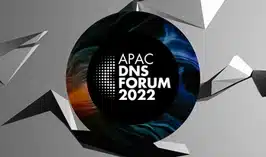May 24, 2022, MontrealCofomo News Service – CNS
Meet An Internet Pioneer
The early days of the internet: Marc Blanchet, Cofomo’s VP Internet Engineering, was there. A veritable pioneer, an internet protocol and infrastructure engineer who played an integral role in establishing the protocols that govern the Domain Name System (DNS).
The DNS works in the background. It lets web surfers employ user-friendly names such as cofomo.com, which are then translated seamlessly into incredibly complex addresses no one could possibly remember, such as 2001:0db8:85a3:0000:0000:8a2e:0370:7334.1
The internet might be a far less frequented place were it not for the work of the Internet Corporation for Assigned Names and Numbers (ICANN) and the Internet Engineering Task Force (IETF) on standardizing the domain name system, internationalizing it, and ensuring we’re secure, our data is secure, and that rogue actors have diminishing returns on their attempts to create mayhem. And Marc Blanchet is there. Always.
On March 31st and April 1st2, Marc presented at the Asia Pacific (APAC) Domain Name System (DNS) Forum, where those in attendance are entrusted with developing the protocols, shoring up the technology, and adapting the existing infrastructure that support and enable the internet. Their work ensures that it becomes more easily accessible to more and more people, for who the internet was, for a time, only a remote possibility.
The APAC DNS Forum served as a touch point for the current state of the system, necessary improvements, associated technologies, its limitations, and how to overcome them, which included the ongoing deployment of the internationalization of the DNS3. The latter is a subject Marc Blanchet has been closely associated with.
Open Access: Internationalization of the DNS
It began during his days as a student at Laval University, where he was awarded his post-graduate degree in Electrical Engineering at the same time a fledgling ARPANET was raising eyebrows. And with reason, this very first packet-switched4 network became the backbone of our modern internet. Marc and fellow stakeholders immediately saw that the existing and then rudimentary DNS was limited and did not allow for the use of characters from writing systems other than those directly stemming from the Latin alphabet. For this Quebecer, the inability of an internet address to accept letters with accents was indicative of its limitations.
By 1996 Marc Blanchet founded Viagénie, a consulting and research & development firm with expertise in advanced computer networking technologies. There he assisted clients such as NASA, ICANN, Videotron, CIRA, and The Canadian Communications Security Establishment. From 2001 to 2003, as a member of the IETF, he co-chaired the working group on internationalization of the DNS to expand its support to as many current and widely used writing systems as possible5.
The Problem
Those who have toiled to bring us the internet have a saying: “Don’t fix it if it ain’t broke.” Simply put: the internet, its infrastructure, and the initial protocols that governed it were not created with internationalization in mind. Much of the world was initially shut out of applying their writing systems to domain names, email addresses and other essential identifiers. This meant that Marc Blanchet’s working group for finalizing the Internationalized Domain Names (IDN) had to determine how best to modify internet protocols to accommodate non-American Standard Code for Information Interchange (ASCII) character maps without disrupting the normal operation of a network that in 2003 was still growing at a phenomenal rate.
It was much like tuning the engine of a car during the Monaco Grand Prix, only doing it while it’s positioning for first place on the straightaway at 300 km/hr. Steady hands…
The Solution
Expanding, improving, and internationalizing something as complex as the internet without creating chaos required a slow, methodical approach. By 2008 most of the work had been completed, but like the internet, its backbone, and associate protocols, this is a work in progress and always will be.6
Marc Blanchet, who spoke to us at length in a recent interview pointed out the serious implications of the misuse of the DNS, particularly after internationalization.
The world currently has 34 major writing systems7, most of which are supported by the DNS. Clearly archaic and extinct ones have been left by the wayside, but it’s safe to say that as of 2008, most of the world’s internet users could access websites and send emails using the script of their choice. It is experts like Marc Blanchet that worry about how our computers and their browsers will translate that systems’ characters into a Unicode equivalent that the current internet address protocols (IPV4 and IPV6) can understand. Without breaking the internet. The rest is a piece of cake. Not.
The Ongoing Issues
Marc Blanchet has other concerns: security, and universal access.
Security is top-of-mind because many writing systems employ characters that resemble each other. This brings with it the growing potential for spoofing, where a rogue actor replaces characters in a known URL with similarly shaped ones from another writing system. For example: the letter Omicron in Greek (‘ο’), is much like the letter o in Cyrillic (‘о’) and to the letter OH in Armenian (‘օ’). See how easy that was?8
Large populations, primarily those in Asia, don’t employ a western writing system, so by default a domain name set in a Latin alphabet would not be understood. An internationalized domain name system is key in providing universal access to the internet.9
These are but two of the issues that face pioneering internet engineering experts like Cofomo’s Marc Blanchet.
Many more will arise as the work of adapting an aging, but ultimately capable network to the growing demands of a data-hungry world. It’s a job that people like Marc Blanchet and those who will follow in his footsteps will carry on. And we’ll carry on surfing in whatever language and writing system we like.
A Bit More About Marc
In 2021, Cofomo acquired Marc Blanchet’s Viagénie clients, and he took on the additional title as their VP Internet Engineering. Who better to serve as a seasoned expert-in-residence than one of those that got their hands dirty working to create the internet that today we take for granted?
Marc Blanchet has no plans to lessen his involvement with the DNS, or to work towards a better, safer, more democratic internet.
Cofomo is proud to count him as part of its team.
—————-
1: https://en.wikipedia.org/wiki/IPv6
2: newsletter-1-APAC-DNS-Forum.pdf
3: newsletter-1-APAC-DNS-Forum.pdf
4: https://en.wikipedia.org/wiki/ARPANET
6: Marc Blanchet interview, May 4th, 2022
7: https://omniglot.com/writing/stats.htm#writing
8: Marc Blanchet interview, May 4th, 2022
9: Marc Blanchet interview, May 4th, 2022





